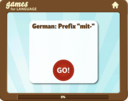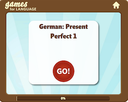
German Language Story Game 2
German Language Story: In the second part of Michael's trip to Germany, (Michaels Reise 2), he visits his aunt and uncle in Frankfurt.
His cousin Julia shows him around the city.
Level: Elementary (A2)
Playing time: 5 minutes
Hear and read Part 2 of Michael's journey in this German Language Game. It contains 130 words and phrases in context.
Practice your pronunciation by repeating every sentence after, or at the same time as the native speaker.
After the story, you can go through flash cards to recall the 10 key verbs below.
10 Key Verbs in Travel Story: Michaels Reise 2
- essen - to eat
- kommen - to come
- zeigen - to show
- bringen - to bring, take
- schlafen - to sleep
- wecken - to awaken
- rufen - call
- schreiben - to write
- gehen - to go
- heißen - to be called
On the computer you can see the translation by rolling over a sentence (but not on a phone or tablet).
To practice and recall the individual words and phrases contained in this story, register or log in and go to German 1, Michael in Deutschland.

German Language Story Game 1
German Language Story: The first part of Michael's trip to Germany, (Michaels Reise 1).
Level: Elementary (A2)
Playing Time: 5 minutes
On his flight from Boston to Frankfurt, Michael orders something to drink and chats with the woman who sits next to him.
Once landed, he meets her again at the baggage claim and finds out that she lives on the Leipziger Straße (on the same street as his aunt).
At Passport Control, the agent is surprised that he speaks German.
Finally, he sees his aunt Monika, who has come to pick him up at the airport.
Hear and read the first part of his journey in this German Language Game. It contains 125 essential words and phrases in context.
Play the story as many times as you like.
To practice your pronunciation, repeat each sentence after, or even along with the speaker.
After the story, you can play Word Shoot and then try the Flash Cards to recall the 10 key verbs below.
10 Key Verbs in Travel Story: Michaels Reise 1
- trinken - to drink
- sprechen - to speak
- üben - to practice
- lernen - to learn
- fliegen - to fly
- besuchen - to visit
- bleiben - to stay
- abholen - to pick up, get
- wohnen - to live, reside
- winken - to wave
You can roll over the text to see the translation in English on a desk- or laptop (but not on a phone or tablet).
To practice the individual words and phrases in the story, register or log in and go to German 1, Michael in Deutschland.

German Language Game: Prefix "mit-"
German Quick Language Game: Prefix "mit-."
Play this quick game to learn how separable prefixes work in German.
The prefix "mit-" is separable.
So, in simple sentences, "mit-" goes at the end.
The prefix "mit-" combines with verbs such as: "kommen", "bringen", "nehmen".
The verbs "mitkommen", "mitbringen", "mitnehmen" are separable-prefix verbs, as in the sentences:
- Ich nehme es gern mit. (I'm happy to take it along.)
- Darf ich mitkommen? (May I come along?)
- Ich bringe auch ein paar Freunde mit. (I'm also bringing a couple of friends along.)
Learn to use these verbs in context with our fun, interactive "Word Invader" game.
The key is say the German OUT LOUD after the speaker.
If you like our games, please SHARE us with your friends.
More Than a German Language Game
Don't forget: You can practice German online for FREE with our 36-Scene German 1 Story: "Michael in Deutschland" and our 72-Scene German 2 Mystery Story Sequel: "Blüten in Berlin?".
(If you already know that "Blüten" means blossom in German - you'll learn that Blüten has still another meaning...).
Just login HERE.
And, if you have any language questions - don't hesitate to contact us!

German Language Game: Present Perfect 1
German Language Game: Present Perfect Tense.
Learn and practice the basics of the German Present Perfect Tense, which is also called the "Conversational Past."
This tense is commonly used in casual conversations when talking about the past.
In English, on the other hand, you would often use the simple past for the same situations.
The German Present Perfect Tense uses the auxiliary verbs "haben" and "sein".
In this short interactive game, you'll learn to conjugate and use "haben" with 4 common verbs.
Here's "haben":
- ich habe - I have
- du hast - you have (fam.)
- er, sie, es hat - he, she, it has
- wir haben - we have
- ihr habt - you-all have
- sie/Sie haben - they/you (form.) have
You'll combine "haben" with the 4 following verbs:
- sagen - to say, tell
- kaufen - to buy
- lesen - to read
- lernen - to learn
A sample conjugation:
- ich habe gesagt - I said
- du hast gesagt - you said
- er, sie, es hat gesagt - he, she, it said
- wir haben gesagt - we said
- ihr habt gesagt - you-all said
- sie/Sie haben gesagt - they/you (form.) said
German, does have a Simple Past Tense.
The Simple Past is generally used to narrate past events, and thus is often called the "Narrative Past." In addition, the Simple Past is used in written German.

German Language Game: Willkommen
German Language Game: "Willkommen" (Welcome).
Learn and practice 18 basic German words and phrases in the context of a mini-story.
The setting is the home of Michael's aunt and uncle in Frankfurt.
This mini-story is also part of our German 1 course.
(You can play the full course for FREE by registering HERE.)
Always when you play, pronounce the words, phrases, and sentences OUT LOUD.
Words in German Mini-Story Language Game
- Willkommen - Welcome
- bei uns zu Hause - at our house
- ich bin froh - I'm glad
- dass - that (conjunction)
- hier - here
- danke - thanks
- nein danke - no thanks
- vielleicht - maybe
- du möchtest - you would like (familiar)
- essen - to eat
- etwas - something, a little
- später - later
- der Orangensaft - the orange juice
- trinken - to drink
- das wäre prima - that would be great
- komm! - come! (familiar)
- mit mir - with me
- in die Küche - to the kitchen
The best way to memorize new vocabulary is to learn the words in chunks, in a context that you can remember.
Writing them out on a sheet of paper or on small index cards is also good.
And, say the words and phrases out loud whenever you can.
If you like our games, please SHARE us with your friends.
More Than a German Language Game
Don't forget: You can practice German online for FREE with our 36-Scene German 1 Story: "Michael in Deutschland" and our 72-Scene German 2 Mystery Story Sequel: "Blüten in Berlin?"
(The literal meaning of "Blüten," is blossoms in German. But the German word Blüten has another meaning that may surprise you.)
Just login HERE.
If you have any language questions - don't hesitate to contact us!
